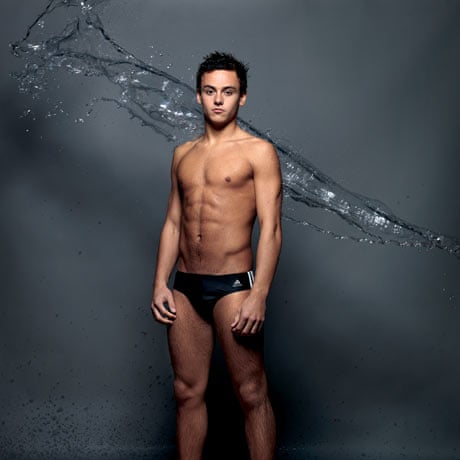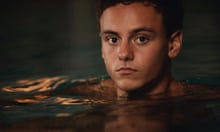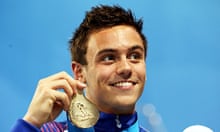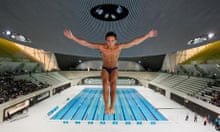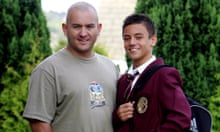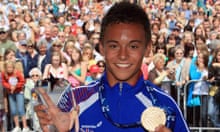Tom Daley is the youngest famous person I've met, and the oldest 16-year-old you could imagine. He glides into the restaurant looking as if he might be auditioning for a boyband or a toothpaste commercial – all peachy skin, perfect teeth and wholesome glow. Then he mentions that this is only his second fortnight off from training in three years. "This has just been my life," he adds cheerfully, "since I was 13 years old."
Daley was just 13 when most of us first heard of him; a squeaky-voiced child from Plymouth who had just qualified to compete in the 2008 Olympic games. The following year he became both British champion and the youngest ever European champion. A year later, he was champion of the world – although he failed to win a medal in Beijing. Along the way he has earned himself seven GCSEs, all As and five of them starred, and is now studying for three A-levels. Earlier this month, he won two gold medals at the Commonwealth Games in India – further elevating already dizzily high hopes of something quite spectacular in London 2012.
What went through his mind when he stood on the podium in Delhi? "A lot of things. You replay the dives in your head, and then you start thinking back. You think of all the bad times, and all the hard stuff in the run-up to the competition, and that's all been part of it, it's been a journey, and then you finally get to that moment when you're standing on top of the podium, and it just makes you…" He breaks off with a rueful shrug. "Well, it's hard to explain. It takes a lot of hard work. People see you win, but they don't understand the amount of hard work and sacrifice."
After school every weekday, Daley does an hour and a half of homework, then trains for four hours in the gym and the pool, before coming home to do more homework. On Tuesday and Friday mornings he trains for two hours before school, and on Saturday mornings he trains again for three hours, before doing homework all afternoon. He describes this training programme as "part-time", and points out that as none of his competitors is at school, his regime represents a mere 50% of their training schedule. Compared with that of his school friends and contemporaries, on the other hand, it sounds like the life of an unusually self-punishing monk.
"But on Saturday evenings I go out with my friends," Daley offers, "to a restaurant or round someone's house to watch the X Factor. My friends just treat me like normal Tom. It keeps me grounded. I'm just a normal person when I go to school."
Daley invokes his normality with touching insistence, yet when I ask him to name the wildest, naughtiest thing he's done, he looks genuinely confused. "What do you mean, wildest and naughtiest? I don't know, there hasn't really been anything." Has he ever been drunk, for example? "No, the only time I've ever even tried alcohol was on my 16th birthday and my mum gave me a sip of, what's it called, champagne. It was disgusting!" He laughs when I say I'm guessing he's never tried a cigarette – "No!" – but quickly adds, "I do go to parties and stuff like that. I just only drink Coke or orange juice."
Daley was 13 when he was first asked for his autograph – "I was like, 'No, you don't want my autograph, no way!' I thought my dad had got someone to go and ask" – and it's now part of his daily life. He hasn't had a steady girlfriend since he was 13, but has received marriage proposals from strangers – mostly from China, where divers enjoy the status of Premiership footballers. "No knickers through the post yet, though," he laughs. "Or not as far as I know; Dad opens my fan mail." Is fame ever oppressive? "No, it's OK. It's nice to have people supporting you. It's not intrusive, it's quite a nice balance at the moment."
I'm almost certain Daley wouldn't even have mentioned the bullying he suffered at his old school had I not brought it up. "It wasn't anything major," he says mildly. "I never really understood why it happened." The PR from his sports management company chips in quickly: "I think it was normal teenage kids' stuff. It's been blown out of all proportion by the media."
Yet in truth, the bullying wasn't normal, and had reached such a point last spring that his father felt he had to remove him from the comprehensive he'd attended since the age of 11. Jibes of "Speedo boy" had escalated into objects thrown at him in class, and threats to break his legs. A private school offered a scholarship, and last summer he moved schools. His father, Rob, is with Daley today; he has said almost nothing until this point, but now volunteers with feeling, "Changing schools is the best thing that's ever happened to him." When I ask if the old school had been supportive throughout the trouble, simultaneously Daley says "Yeah" and his father says "No". They both look at each other.
"Yeah, they were," Daley protests.
Rob throws him a dark look and mutters, "I don't think so. If they were, you'd still be there, wouldn't you?"
"This isn't an interview with you," the PR intervenes hastily, with an anxious smile.
"Sorry. I'm not allowed to talk." Rob retreats.
"Yeah, he is," Daley laughs affectionately. "He's just being an idiot. They were very supportive." Rob pulls a face that makes his views very clear.
"The only reason it got bad was just cos the media blew it out of all proportion," Daley insists valiantly, "and then there wasn't anything I could do cos the people at school would see it in the newspapers and think they were getting to me, that kind of thing. That made it a little bit worse. But the new school's completely different, it's full of young people who understand about training and everything. And the good thing is, I still see all of my friends from my old school. I still meet up with them at least once a week."
For a moment you glimpse what life must sometimes be like for Daley's father. A former taxi driver and only 39 himself, softly spoken with a gruff deadpan humour, some of the challenges his son faces must feel almost unbearable – and yet the teenager has the sort of gravity-defying disposition that seems ordained to rise above them. The same dynamic emerges when I ask about Blake Aldridge, Daley's diving partner at the Beijing Olympics. At the time Aldridge was 26, Daley just 14, yet when the pair performed poorly in Beijing, Aldridge turned shockingly petulant, publicly blaming Daley for their failure. For the teenager it must have been devastating and humiliating, and the following year their partnership was terminated. I'd read that they no longer speak, yet when I ask Daley if they're still friends, he says, "Yeah! Yeah, we still get on really well. We've never really spoken about what happened. We've kind of just like left it, and like forgot it happened, kind of thing." His father has been less generous about Aldridge in the past, yet when I mention this there is an awkward silence. It looks to me, I suggest with a laugh, that the PR is giving Rob the eye, warning him not to say anything. "Yup," Rob nods, grinning. "I can see she is, and I'm not even looking at her."
Was it true, as was widely reported at the time, that Aldridge resented the attention his more famous younger partner was getting? For a second there's an awkward silence. "Blake's the type of character that's so nice," Daley offers with a big generous smile, "but he just does silly things without thinking. I think it was just down to frustration, really."
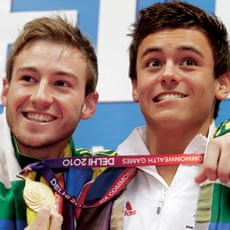
To be a world-class athlete today requires an extraordinary range of qualities, of which talent and dedication are only two. It also demands a media-friendly temperament – eternally sunny, diplomatic, philosophical, upbeat – and the remarkable thing about Daley, as far as I can see, is that his perfection of this persona appears entirely authentic. He did have, he says, a few hours of media training prior to the Commonwealth Games, but I'd guess it was entirely unnecessary, for he is, as they like to say on The X Factor, the whole package.
So it does seem terribly unfair that there's no money in diving. Sponsorship deals are few and modest; Daley's father travels to all his competitions, but must pay for his own flights and hotels, and even his own tickets to the venue. Rob has supported his son faithfully, despite currently undergoing chemotherapy for a brain tumour, and has suffered accusations of "pushy parent syndrome" – particularly following a press conference last year, after Daley had beaten the Olympic champion, when Rob stood up and said, "I'm Tom's dad. Come here, Tom, please give me a cuddle."
"Well, wouldn't anybody," he says quietly, "who'd spoon-fed their son, learned to ride a bike, brought them to school, and then watched him do what he did? All I do is support him as my son. I don't get involved in everything else."
The PR says firmly, "I've worked with a lot of pushy parents and, trust me, Rob isn't one."
The pair tease each other playfully with the easy intimacy of any ordinary teenager and dad, but with every passing year and medal the family dynamic must be changing. When I ask Daley what his vice is, his answer is so bewilderingly grown-up that for a moment I'm thrown. "I guess the thing you can say is if you work hard success will follow." He sees my confusion, and realises the error. "Oh, I thought you said advice! Um, my vice…" He thinks hard. "Well, I can't kick a ball in a straight line. And I can't catch."
"He doesn't go to bed when he's told to," chips in Rob. "And he doesn't keep his room tidy."
"I do!"
"So how come I'm always picking stuff up?"
"You're not!"
"Trust me," Rob says. "He's not great on household chores."
"That's cos I'm always doing homework or diving," Daley protests.
For all Daley's extraordinary success, when you consider what his diving career has demanded of his young life and his family – his two younger brothers and his parents, who all live together in a modest home – I can't help but wonder how it can be worth it. His gold medals don't, as he says, translate into a life of wealth. Within days of winning in Delhi he was back at school, studying for A-levels and training for the next competition.
"I know." He smiles. "It's weird, cos if I was a footballer and had achieved European champion, world champion and Commonwealth champion in football, it would be a completely different story." So what is it about winning that makes it all worthwhile? His reply hasn't a trace of self-aggrandisement; to him, it is no more than a statement of the compellingly obvious.
"The fact of that you end up being the best in the world, the best in Europe, the best in the Commonwealth. It's something that not many people can say."
